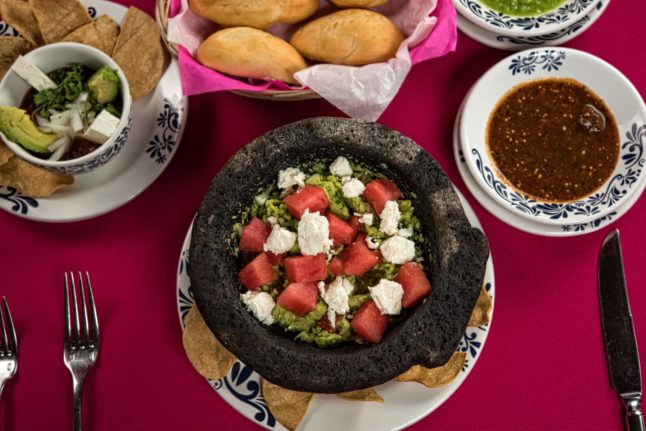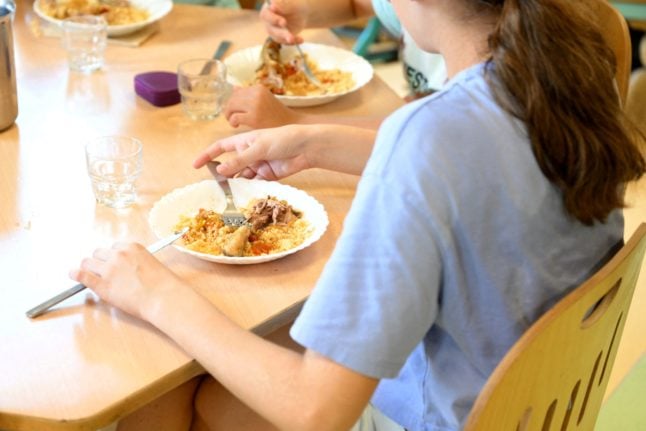At first glance, you might assume France is a haven for Mexican food, given advertisements for ‘tacos’ all over the place. But beware – ‘French tacos’ are a different thing entirely.
READ MORE: France’s national fast food: What exactly are ‘French tacos’?
Home to a smaller Mexican diaspora, France has far less Mexican and Tex-Mex style restaurants when compared with North American countries, leaving foreigners from the US, Canada and Mexico itching for some mole or tamales.
That’s before we get to restaurants that have set their spice levels for the average French palate (ie not so hot).
We asked readers for their recommendations, and here’s what they said;
In Paris
Unsurprisingly, the French capital – with a burgeoning international food scene – has the greatest choice of Mexican places including the American chain Chipotle and the French BocaMexa which has several Paris sites.
El Nopal (75010 and 75009)
With sites at Canal Saint Martin and Pigalle, El Nopal is a favourite of many Mexican-food lovers in Paris.
Four different readers of The Local recommended it as either their first or second-place pick for a go-to Mexican restaurant in Paris.
David Sturman in Paris wrote: “It’s a small hole-in-the-wall restaurant with a small but delicious menu,” and reader Jonah Church, also based in Paris, called it an “authentic Mexican taqueria like in Mexico, So Cal and Baja California”.
Itacate (75001)
Tina M. Lowrey recommended Itacate, near the Louvre-Rivoli Metro stop.
She chose it as her preferred place to eat Mexican food in France because of the “very good tacos and salsas!” Lowrey did have one complaint, she said she “[wishes] they had real margaritas (on the rocks, not frozen)”.
The restaurant does not only serve tacos and tortas, it also lists the classic Mexican dish Alambre on its menu as well.
El Cartel del Taco (75010)
Reader Esteban Garcia said this restaurant, not far from the Jaurès Metro station, has the “best salsas”. He also listed it as his favourite thanks to the “authentic tacos”.
Owned by a Franco-Mexican couple, the restaurant says on its site that it is “committed to using fresh, authentic ingredients, imported directly from Mexico, to bring to life dishes rich in flavour and diversity.”
Mamacita Taqueria (75009)
Popular not only for its tacos, but also its cocktails, Mamacita Taqueria can be a lively spot for nightlife in Paris. According to the restaurant’s website, if you visit in the evenings between Thursday and Saturday you’ll see it “come alive with DJ Sets, impromptu live performances and other sorpresas!”
Reader Rebecca Brite said she picked it as her favourite because Mamacita Taqueria has “some of the more authentic Mexican flavours I’ve found in Paris.”
Nomás Tacos (75002 and 75010)
The popular Mexican street food joint has three locations – two of which are in Paris, plus a popular Instagram page. You can also test out their new ‘Pink Taco’.
According to Kevin Kessler, who lives in the suburbs of Paris, this restaurant ranked at the top of his list for its “authentic flavour, great guacamole, good pico, and choices of meats.”
They do not take reservations.
Acà (75010 and 75018)
With two locations in some of Paris’ busiest neighbourhoods: Pigalle and Republique, Acà was also a favourite of readers of The Local.
The restaurant has also been known to offer ‘Taco Tuesday’ deals, with tacos for just €1. Reservations can be made here.
El Guacamole (75010)
Californian reader Nobie Kawasaki recommended this restaurant because of its “authentic Mexican food.”
She said she “[loves] the taco trio with multiple hot sauces served on the side.”
On their website, El Guacamole describes their food as “100 percent homemade” with “spices imported directly from Mexico.”
READ MORE: Readers recommend: The best Indian restaurants in France
Anahuacalli (75005)
Unlike some of the fast-casual options listed above, Anahuacalli offers a more refined menu. You can make reservations ahead of time online.
One recent TripAdviser reviewer called it “Wildly, uniquely great Mexican food” saying that it was “the only restaurant we dined at twice in February while in Paris for eight days.”
Reader of The Local, Abhijeet Dev, called it a “close contender” for best Mexican restaurant in France.
Burritos Hermanos (75015)
Boasting vegan and vegetarian-friendly options, Burritos Hermanos is owned and operated by reader of The Local Joanne Carter and her husband.
Joanne told The Local: “we opened in mid-June after being delivery only during the lockdown. We have great feedback and the food is truly delicious.
“Many people from Latin America, California, Mexico, have dined with us and said they love the food too. My husband is a really talented chef and we’ve created a really warm, relaxed atmosphere too.”
Outside of Paris
El Sol Azteca, Saint-Germain-en-Laye
This restaurant was a favourite for multiple survey respondents.
According to reader Abhijeet Dev, who lives the same area as the El Sol Azteca, the restaurant “[delivers] authentic Mexican taste in everything they serve, spiced up as much as you can handle in authentic Mexican way”.
READ MORE: Do the French really hate all spicy food?
Mexican at tiny El Sol Azteca in Saint Germain en Laye. Must reserve. 😋
— Amy Porter Dems Abroad France 🟧 (@AmyPorter_Paris) November 10, 2023
You can make a reservation online here.
Alebrije, Lyon
Another top pick among readers, Alebrije, located in Lyon’s 4th arrondissement, continues to be listed in the French press and review magazines as a restaurant worth visiting.
While it was temporarily closed as of November 2023, according to the website the reopening is scheduled for January 2024.
One reader of The Local, Erica, who currently lives in Versailles but used to live in Lyon, chose it as her favourite. She said “it is run by chef Carla Kirsch who is a Mexican chef! Cannot get more authentic than that! The atmosphere is great and so is the food.”
Another reader, Patrick, who lives in the Provence-Alpes-Côte d’Azur region, said: “It’s delicious and the chefs consistently achieve an intriguing fusion of traditional Mexican flavours and French culinary practices.”
La Santa Cruz, Villiers-sur-Marne
There are also Mexican options in the Paris suburbs, like La Santa Cruz in Villiers-sur-Marne along the RER E.
Reader Toby Parker told The Local: “I grew up in Texas and the Mexican food here is good enough to be good in Texas.” High praise.
Chipotle, Lyon – the American chain also has a presence in the Westfield shopping mall at Part Dieu railway station.
Nomás Tacos, Lille
And finally, Nomás Tacos (listed above) also has a location in Lille. More information here.
TACO&CO, Nice
Reader Sue Holloway, who lives in Nice but is from California said called this restaurant “the closest to CA Mexican food that we’ve found so far.”
The restaurant also offers an ‘Épicerie Méxicaine”, with plenty of grocery items including spices, sauces and peppers.
Best tips for enjoying delicious Mexican food
Several readers also shared their tips for finding decent Mexican restaurants in France. Esteban Garcia said “avoid places with nachos on the menu”, other readers, like Abhijeet Dev advised avoiding the word “fusion”.
Erica in Versailles also advised checking out the staff. “Mexican chef = good Mexican food!” she said.
For Rebecca Brite, it was important to temper expectations. She advised patience, telling The Local that “you have to eat a lot of inauthentic crap to find the good ones.”
Jonah Church had similar advise, saying that it comes down to “trial and error.”
“You can tell pretty quickly by the ingredients they use and the spices if it’s authentic. Actually a lot of it comes down to the spices used. And of course always look for fresh tortillas!” Church said.
Joanne Carter recommended checking out the list of Mexican restaurants provided by the Mexican Embassy’s website (found here).
The Embassy also noted that anyone is welcome to send recommendations for restaurants that are not already on the list – you can send them to “[email protected]”.
Some readers, recognising the small pool of options for Mexican restaurants, advised cooking the food yourself.
In order to do so, you might want to visit any nearby Mexican grocery stores or Épiceries. For Paris, Jonah Church advised going to “Mexicœur” because “it has a good selection of Mexican products. There is also a really good Mexican Bakery called Gourmandises Mexicaines in Paris as well servicing traditional Mexican baked goods and desserts.”
Patrick in the south of France also recommended learning to make the food yourself. “There are a number of French online shops run by Mexican immigrants where you can order authentic ingredients to make tacos, moles, pozole, etc,” he advised.
For those trying to keep spice levels hot, reader Kevin Kessler said “If you’re looking for good peppers/tomatillos, try Westland Peppers. It’s a farm to table (yes they deliver) for all things spicy and glorious.”
Do you have a favourite Mexican restaurant in France? Tell us about your experiences finding (or struggling to find) decent Mexican food in the comments below.



 Please whitelist us to continue reading.
Please whitelist us to continue reading.
Comer in Paris.
I can’t believe it’s not on your list!
https://www.parismexico.fr/
El Pueblo, 4 rue de Candolle, in Montpellier. Chef Aviles, from Mexico City brings authentic and traditional recipes from his hometown. He and his wife run this charming restaurant in the historic center of Montpellier.